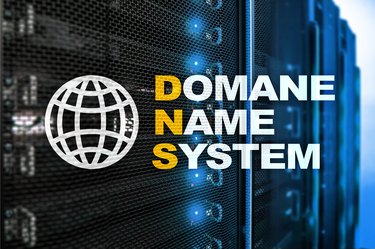
Running into an error with the Domain Name System — simply called a DNS error — means you won't be able to get access to the internet, which is frustrating if it happens regularly. Learning the most common causes of DNS issues and the best methods for fixing them can help you get back online with minimal effort. Essentially the DNS translates the domain names we use to access websites into IP addresses, which is what your computer actually uses to access the website. In most cases, a DNS problem is easy to fix.
Network Problems
Video of the Day
In many cases, an error attributed to DNS could be a simple connection problem (especially if you're connecting wirelessly using a laptop) that doesn't really relate to the DNS at all. Before blaming DNS errors, go to your "Network and Sharing Center" and run the troubleshooter. This will identify and fix many common connectivity issues and can help you narrow down the cause of the issue.
Video of the Day
It's also possible that a problem in a server that forms part of your network is causing the DNS malfunction. You can test for connectivity across the network by pinging other routers or computers that share the DNS server. Open "Command Prompt" and type "ping" followed by an IP address.
A common example you can use (aside from another computer on your network) is "8.8.8.8" which is the Google DNS server. If you get a "Request timeout" error, there's a problem with your connection or network.
Common DNS Issues: TCP/IP
One of the most common causes of DNS errors is the TCP/IP software, or the Dynamic Host Configuration Protocol (DHCP), which assigns IP addresses to devices and handles the DNS server addresses. The simplest way to rectify these issues is simply rebooting your computer, but you can also use a TCP/IP utility program to fix your settings.
Finally, it's also worth checking that your router and the device you're using have DHCP enabled, because if one of the two doesn't, this can lead to connection problems.
Internet Provider DNS Problem
The majority of internet users get their DNS server addresses from their internet provider, which happens automatically and is likely to be the case if you haven't intentionally changed your DNS server. When the provider's server is overloaded or simply malfunctioning, this can lead to a "DNS server not responding" error or other DNS problem.
Changing your DNS server can fix this problem. One common alternative is to use the Google DNS servers instead, or the OpenDNS system. Go to your router's configuration settings and manually enter the IP addresses for your chosen server to switch from your provider's automatically-chosen server.
Malware Affecting the DNS
In some cases, malware of various types can lead to an apparent DNS error. One example mentioned by Tech Republic is a virus that affected the TCP/IP stack and intercepted requests sent through it, producing what looked like a DNS error that was actually a virus . Solving this is as simple as running a scan and removing any identified malware with an up-to-date anti-malware program.
Anti-Virus Program Issues
Unfortunately, both viruses and anti-virus programs can lead to DNS errors. When the anti-virus database is updated, there can be errors that lead the program to think your computer is infected when it actually isn't. This, in turn, can lead to "DNS server not responding" errors when trying to connect.
You can check to see if this is the problem by temporarily disabling your anti-virus program. If your connectivity issue is resolved, the problem was likely caused by the program. Changing programs or simply getting the most recent update can rectify the issue.
Modem or Router Problems
Minor errors with your modem or router can lead to DNS errors, too. These can be easily fixed by restarting the device (they'll usually be combined into one box), although the fix might only work temporarily. It isn't likely that your router and/or modem will produce DNS errors regularly, but if it does, getting a replacement may be the only solution.
- PC Risk: How To Easily Fix The "DNS Server Isn't Responding" Error On Windows 10?
- LifeWire: Solve DNS Server Not Responding Errors on Your Network
- Tech Republic: 10 Tips for Troubleshooting DNS Problems
- Microsoft Windows Support: "Your Computer Appears to be Correctly Configured, But the Device or Resource (DNS Server) is Not Responding" Error Message in Windows 7
- Reference: What Causes a DNS Error?